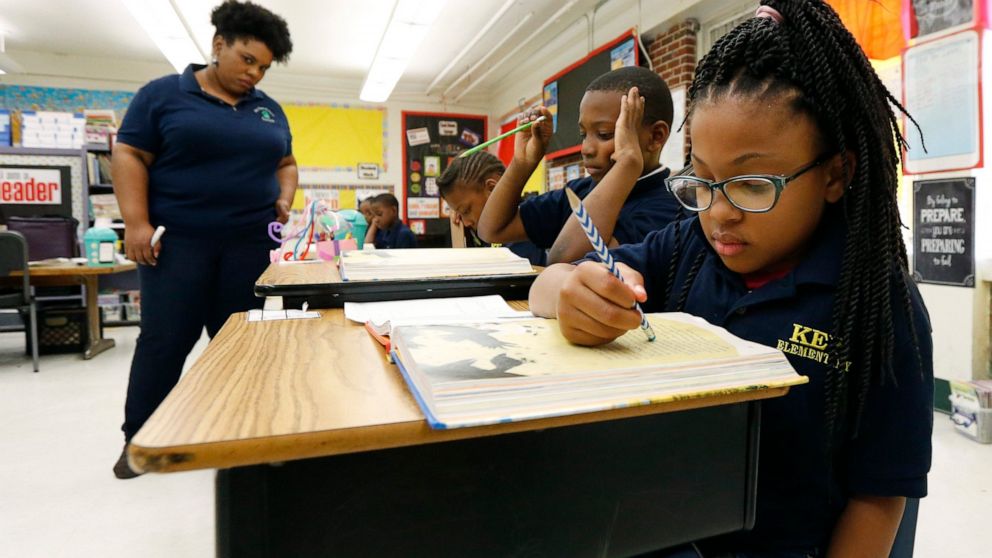
More than 35,000 Mississippi third graders sat down in front of computer this week to take reading tests, facing a state mandate to “level up” or not advance to fourth grade. But with the bar set higher this year, state and local officials expect more students will fail the initial test, even with efforts to improve teaching.
Mississippi is one of 16 states nationwide that demand third grade students pass a reading score threshold or flunk. Nevada and Michigan plan to impose such requirements in the next two years, and Alabama lawmakers are considering one.
The mandatory retention policy remains controversial nationwide. Experts agree students who flunk a grade are more likely to drop out. While third-grade reading policies typically call for intensive remedial work for students who are held back, one study found the boost helps for a while but eventually fades.
For students, parents and teachers, the high-stakes testing can bring butterflies, although Mississippi hasn’t seen the organized pushback against testing seen in many other states. Bernardytte Robinson, a fifth grade math teacher at Key Elementary in Jackson, said her daughter Ayden Harris, a third grader at the same school, has been sweating the exam since school began in August.
“She said ‘I don’t want to fail, mom,'” Robinson said Ayden told her on Monday, the first day of testing. “I said ‘You’re not going to fail.’ I said ‘You’ve got this.'”
When the Magnolia State implemented its requirement in 2015, students only had to reach the second, or basic, level on a state test scored in five tiers. This year, the state is raising the bar, saying students must reach the third level. That’s still one step short of proficiency, but state Superintendent Carey Wright and others say it’s important to raise expectations.
“We needed to do this, and we need to do this in increments, because we wanted to make sure that our students began moving more toward the proficient level and being more prepared for fourth grade,” said Kymona Burk, the state literacy director.
The Republican policymakers who adopted Mississippi’s plan from Florida support it, pointing to improvements in performance on a nationwide test. Mississippi is paying for literacy coaches to help improve instruction in 182 of 420 schools statewide with a third grade. The state has also provided training on teaching reading to 13,000 people, and provides extra money for summer schools for struggling readers.
Last year, 93% of Mississippi students passed at the basic level on their first attempt, but only 75% reached the third level. Burk said the share of students scoring three or above has been increasing, but she predicts only about 80% will pass. Schools will get scores in early May and students retest in mid-May. A second retest comes after summer school. About 3% of students were allowed to advance last year without passing for various reasons.
Mississippi has long flunked the largest proportion of young students nationwide, often students from poor households who enroll lacking groundwork for academics. Last year, Mississippi held back 9% of kindergartners, 8% of first graders and 6% of second graders.
Harvard University education Professor Martin West studied Florida, where then-Gov. Jeb Bush pioneered the third grade policy. The policy has been promoted in Mississippi and other states by the Foundation for Excellence in Education, which Bush chairs. West said his study finds students held back because of reading problems aren’t any more or less likely to drop out, compared to students who just barely pass. He said students who flunk and get intensive help in Florida get an academic boost for several years, but said it fades out.
Overall, West said he can’t prove third-grade retention policies work. He said states that appear successful “have used the requirement not primarily as a way to retain more students, but as a focal point to concentrate educators’ attention on improving literacy in early grades.”
Last year, all students at A.W. James Elementary in Drew passed on the first try, but Principal Barbara Akon isn’t so sure all her 39 third graders will clear the bar this time. Despite an average class size of 13 and intensive focus, Akon said pretests showed six students in danger of failing. She said the Mississippi Delta school set a pass-rate goal of 90%, or 35 students.
“We want 100%, but this being the first time they’ve had to score this high, we have some concerns,” Akon said.
Outcomes could be worse elsewhere. Adrian Hammitte, interim superintendent in Jefferson County, said he overhauled reading instruction when he took over this year, with help from outside consultants. But only 45% of Jefferson County’s third graders scored three or above last year, and 16% flunked third grade.
“With the new score needed, that level three, and how we performed last year, I’m a little nervous,” Hammitte said of his 110 students. “I feel good about what we put in place. Now we just wait and see.”
———
Follow Jeff Amy at: http://twitter.com/jeffamy .





